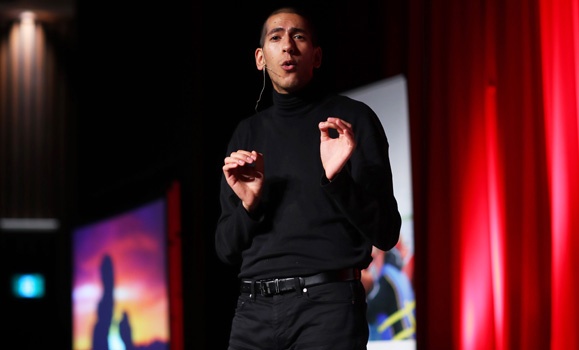Medical Neuroscience PhD student Tareq Yousef was the big winner of DalhousieтАЩs eighth annual 3 Minute Thesis (3MT) competition held on Wednesday evening in the Student Union BuildingтАЩs McInnes Room.
The competitionтАЩs final round saw 10 graduate students show off their groundbreaking research in accessible 180-second presentations in front of a packed crowd of 200 people. It was hosted by CBC reporter Brett Ruskin for the third straight year.
Yousef took home first place for his presentation, Horizontal Cells Help Us See from Sunrise to Sunset, and also the PeopleтАЩs Choice Award, as voted on by the audience. The win earned him the top prize of $2,000 and a spot in the 3MT regional competition being held at Saint MaryтАЩs University. The PeopleтАЩs Choice Award, sponsored by Estelle Joubert and Paul Doerwald, earned him an additional $500.
The fourth-year PhD student was quick to credit others following his victory. тАЬI definitely didnтАЩt do this on my own. I got so much help from other people,тАЭ Yousef said, crediting his boyfriend, his supervisor Dr. Bill Baldridge and Dr. Lynne Robinson for helping him with his talk.
тАЬEven all the way back to my undergrad days, Dr. Leanne Stevens was such a big mentor for me in science communication. ItтАЩs a big job to trim a lot of the nuance and get to the foundations of what weтАЩre working on.тАЭ
тАЬLike a kid in a candy storeтАЭ
University President Deep Saini (pictured below) was in attendance for the first 3MT of his ║┌┴╧│╘╣╧═Їtenure and provided opening remarks. Having experienced the event at institutions in Australia and Canada, he said he felt like a тАЬkid in a candy store,тАЭ because of the delight he took in hearing the diversity of ideas on display.
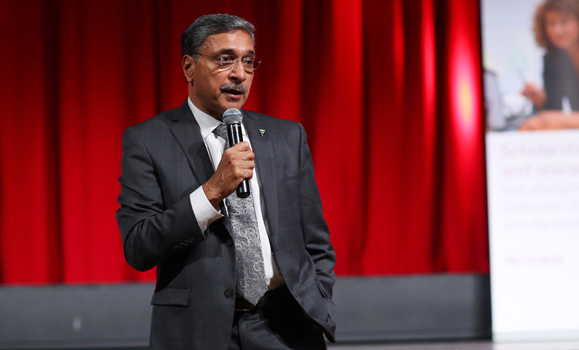
тАЬDal is by far the foremost research-intensive university in Atlantic Canada and one of the top research universities in the U15. You canтАЩt hope to be within the U15 without having outstanding graduate students at the masterтАЩs and PhD levels, and we have both.тАЭ
He also stressed the importance of knowledge translation. тАЬI canтАЩt imagine a better way of honing the skill of telling the story of your research than a 3 Minute Thesis presentation. ItтАЩs the ultimate elevator pitch.тАЭ
Practice makes perfect
Also a finalist in 2019, Juliana McLaren (pictured below) of the School of Communication Sciences and Disorders improved on last yearтАЩs performance with a second-place finish. Her presentation, Two Truths and a Lie, explored hearing loss and its relationship to dementia. She called on the audience to drown out part of her presentation by asking them to make a shushing noise to emphasize how hearing loss prevents sufferers from getting the information they need.
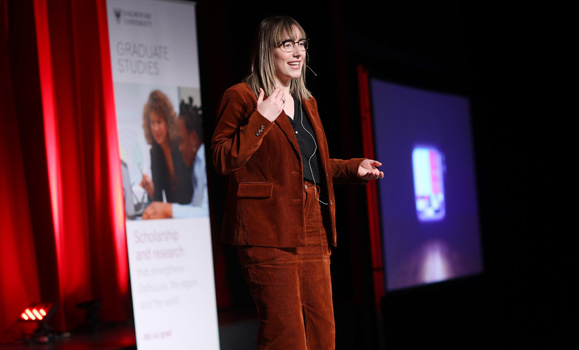
A superhero for your spinal cord
Spider-Man may exist only in comic books and on the big screen, but Lizzy Baker (pictured below) drew inspiration from the web-slinger en route to a third-place performance. A Biochemistry & Molecular Biology student, BakerтАЩs presentation, My Spidey Senses are Tingling: Engineering Spider Silk for Nerve Regeneration Following Spinal Cord Injury, asked the audience to imagine the role synthetic spider silk could play in the spineтАЩs recovery process.
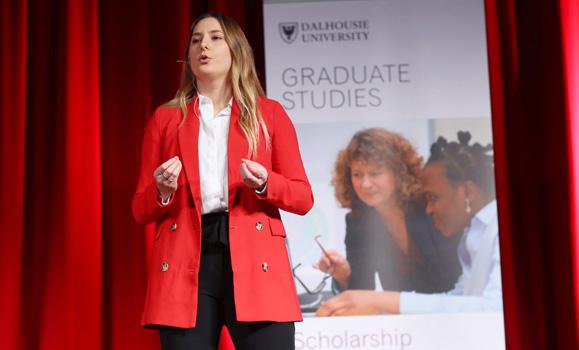
тАЬThe highlight of the yearтАЭ
Marty Leonard, Dean of the Faculty of Graduate Studies, said she was proud of the students who took on 3 Minute Thesis, not just because of the challenge of speaking in front of an auditorium full of people but because of their commitment to serving the public by sharing their research beyond the university.
тАЬFor me and everyone at the Faculty of Graduate Studies, 3MT is the highlight of the year,тАЭ said Leonard while addressing the crowd. тАЬIt brings together our grad community and is a wonderful opportunity to showcase the quality and the diversity of the research our graduate students are doing.тАЭ
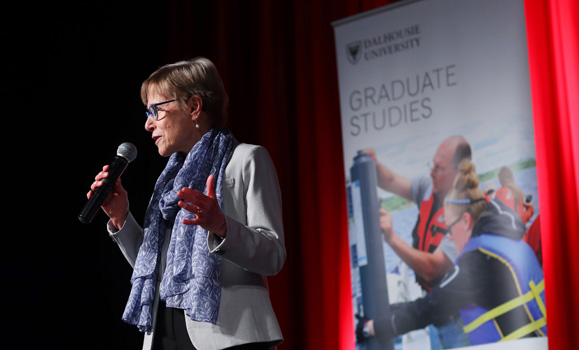
Marty Leonard
Complete list of finalists
The 10 finalists, representing programs from across the university, earned their places by advancing out of a field of 80 of their peers during first-round heats held Tuesday.
Elise Aronitz, Psychology & Neuroscience, Using Darkness to Shine Light on the Molecular Mechanisms of Visual System Plasticity
Lizzy Baker, Biochemistry & Molecular Biology, My Spidey Senses are Tingling: Engineering Spider Silk for Nerve Regeneration Following Spinal Cord Injury
Isobel DeMont, Civil & Resource Engineering, ItтАЩs All Green to Me: Algae and the New Age of Drinking Water Treatment
Laura (Cole) Hirello, Health Administration, Health, Wealth & Measurement: Equity in the Canadian Health Care System
Nicole MacKenzie, Psychology & Neuroscience, Parents and Needle Pain: Keeping Knowledge from Getting Lost in Translation
Caitlin McCavour, Earth & Environmental Science, The тАЬLimeтАЭ Between Unhealthy and Healthy Forests
Juliana McLaren, Communication Sciences & Disorders, Two Truths and a Lie
Chad Simmons, Biology, Treasures in our Backyard: Exploring Rare Forest Plants in Nova Scotia
Sean Thornton, Chemical Engineering, Green Solar Energy
Tareq Yousef, Medical Neuroscience, Horizontal Cells Help Us See From Sunrise to Sunset

